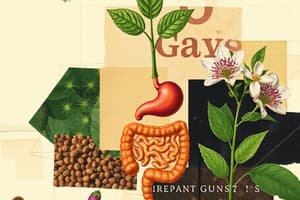Podcast
Questions and Answers
What is the main function of the digestive system?
What is the main function of the digestive system?
To break down ingested nutrients so they can be absorbed and utilized by cells.
Which organs make up the digestive system?
Which organs make up the digestive system?
Mouth, esophagus, stomach, small intestine, large intestine, liver, gallbladder, and pancreas.
What is the role of enzymes in the digestive system?
What is the role of enzymes in the digestive system?
Enzymes help break down food molecules during digestion.
How does the digestive system handle waste?
How does the digestive system handle waste?
What is the function of the circulatory system?
What is the function of the circulatory system?
What are the main components of the circulatory system?
What are the main components of the circulatory system?
What is the main function of the circulatory system?
What is the main function of the circulatory system?
Which organ acts as the central pump in the circulatory system?
Which organ acts as the central pump in the circulatory system?
What is the systemic circuit responsible for?
What is the systemic circuit responsible for?
What is the pulmonary circuit responsible for?
What is the pulmonary circuit responsible for?
What are the main functions of the urinary system?
What are the main functions of the urinary system?
Where does urine travel after being formed in the kidneys?
Where does urine travel after being formed in the kidneys?
Study Notes
Life Processes: Exploring the Digestive, Circulatory, and Urinary Systems
Life is powered by intricate systems working together within organisms to sustain existence. Three essential body processes—digestion, circulation, and excretion—enable life's continuance through a series of interconnected functions. This exploration dives into these three vital systems, starting with how we process food, followed by our internal transport and waste removal mechanisms.
Digestive System
The digestive system plays a pivotal role in breaking down ingested nutrients so they can be absorbed and utilized by cells. It comprises several organs, including the mouth, esophagus, stomach, small intestine, large intestine, liver, gallbladder, and pancreas.
Ingested food enters the mouth, where mechanical and chemical breakdown begins, primarily via chewing and saliva production. As it moves through the other stages of digestion, enzymes from numerous glands and secretions from organs like the liver, gallbladder, and pancreas continue to break down food molecules until absorption occurs across the membranes lining the gut.
Digestion doesn’t end there; residues left over after nutrient extraction become feces and are expelled from the body via the rectum and anus. Waste management and mineral balance are also maintained by this final stage of excretion.
Circulatory System
The circulatory system facilitates oxygen exchange between the body and its surroundings while simultaneously distributing water, electrolytes, hormones, and various other essential components throughout tissues. The heart acts as the central pump, driving blood flow throughout the systemic and pulmonary circuits. Oxygenated blood returns to the heart from lungs, whereas deoxygenated blood originates from tissues and organs.
Blood vessels consist of arteries, veins, and capillaries, which form a vast network delivering fresh blood wherever needed. Capillaries allow direct exchange of material between blood cells and cellular structures of surrounding tissue.
A thorough understanding of the cardiovascular system requires knowledge of the structure and function of its two main parts: the systemic circuit, responsible for supplying oxygen and nutrients to body cells, and the pulmonary circuit, catering exclusively to gas exchange with the respiratory system.
Urinary System
The last essential process explored herein is urine formation and elimination. Our kidneys serve as primary filters, removing excess waste products such as urea, ammonia, and sodium chloride from our bloodstream. Other essential tasks performed by the renal apparatus involve regulation of acidity levels, blood pressure maintenance, and maintaining appropriate concentrations of important minerals like calcium, phosphorus, potassium, and magnesium.
Urine formed during filtration travels from the kidney along tubules, which eventually empty into collecting ducts before entering the bladder, ready for storage and eventual release during micturition (urination).
These life processes are interdependent and work cohesively to support overall wellbeing. Understanding their roles will help us appreciate better the miraculous daily operations occurring inside each of us.
Studying That Suits You
Use AI to generate personalized quizzes and flashcards to suit your learning preferences.
Description
Explore the intricate systems of the digestive, circulatory, and urinary systems, essential for sustaining life. Learn about digestion, circulation, and excretion processes that enable nutrient absorption, waste removal, and oxygen distribution within the body.




